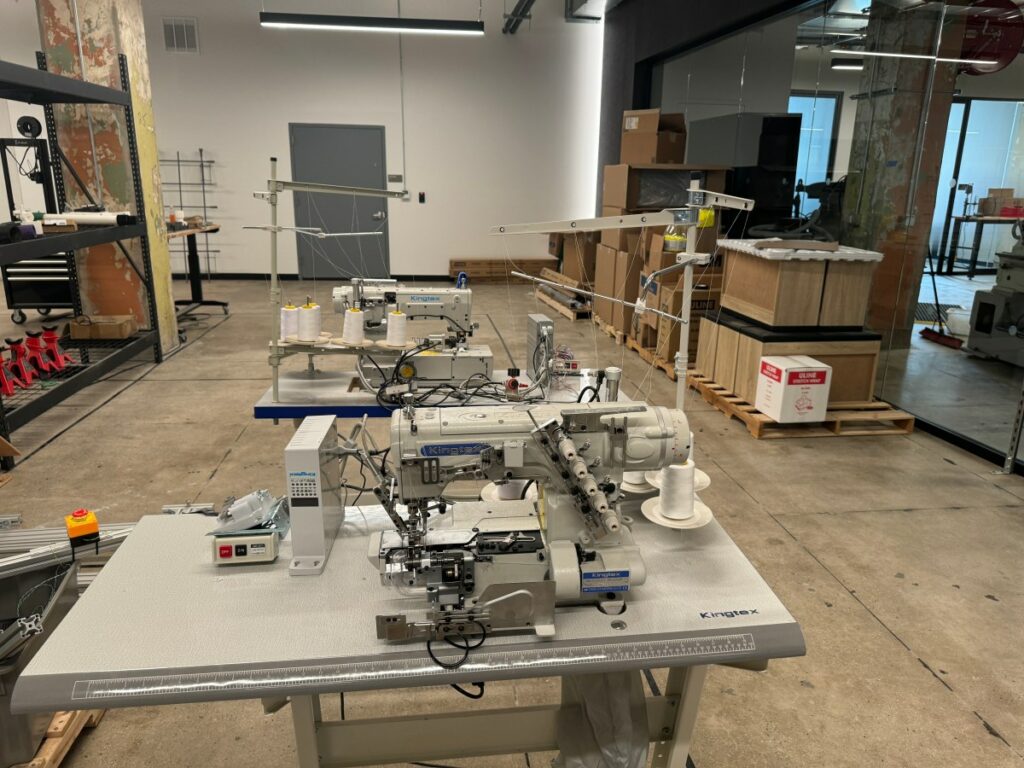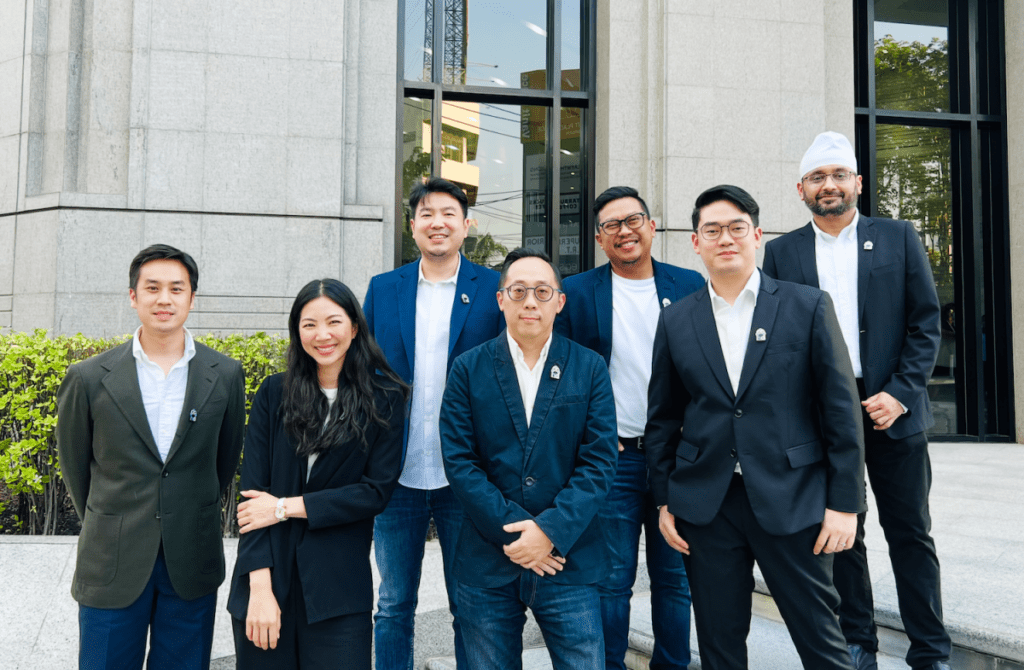A few weeks back, TechCrunch ventured out to New Jersey to pay an early visit to HAX’s Newark offices. As much as I complained about the 90-minute commute in from Queens, it’s nothing compared to the last time I paid a visit to the SOSV-run hardware accelerator’s Shenzhen space.
HAX’s China operations have shrunk considerably since then, courtesy of a global pandemic and all of the ensuing lockdowns. That space had remarkable proximity to the global supply chain. One simply had to walk downstairs into mall-like spaces, filled wall to wall with component vendors.
In some ways, the Newark space is a reflection of the Shenzhen offices. There’s a faint sense of déjà vu, entering through the doors and spotting the familiar stadium seating where company and startup meetings are held. The China offices were far more lived-in by the time I visited. As the first news organization to visit the HAX space, we were greeted with walls of boxes awaiting the recycling truck — a familiar sight to anyone who’s ever moved office or house.
One key thing the new office has is plenty of space. The Newark “flagship” is 35,000 square feet, funded — in part — by $25 million from the state of New Jersey. While the city of Newark does maintain some manufacturing facilities, startups here can’t simply skip down to the massive Shenzhen markets to get a new part or have an old one machined. Instead, HAX has invested a lot into on-site equipment, including metal fab, 3D printing, CNC machines and laser and water jet cutters. There’s even a chemistry lab on-site for deep tech projects.
HAX will host its first demo day in four years here. The list includes more than 30 companies, across climate, manufacturing, computing, health and energy. We’ve got the exclusive list of all those companies showcasing (below).
Here are a few notable ones TechCrunch has chatted with over the years:
CocoonCarbon: U.K.-based CocoonCarbon has built a small factory inside a shipping container that is capable of turning steel runoff (turns out it’s called “slag”) into sustainable cement.
PureLi: Founded nearby, this Princeton University startup has designed a simple system it promises can dramatically speed up lithium extraction in brine lakes. Located primarily in South American countries like Chile, these “lakes” are produced when drilling for oil and gas. The startup is currently working on a rev share model, using a technology it says can double or triple the evaporation rate.
Renovate Robotics: We first covered this robotic roofing firm last March, when it announced a $2.5 million seed round. The news also found HAX associate/analyst Dylan Crow jumping to the startup side of the fence as COO. Renovate produced a winch-based robot that installs roof shingles in a gantry-like X,Y axis pattern. Roofing is an extremely dangerous business that’s prime for automation.
Silana: This Vienna firm is working on a robotic system that can completely automate the sewing process. Once completed, the startup says its technology (pictured at the top of the post) will be able to increase production speeds by 4x, while lowering costs and CO2 by 82% and 38%, respectively.
Swap Robotics: Swap has been around for a minute already. The firm actually competed in TechCrunch’s Startup Battlefield at Disrupt 2022. Founded in 2019, the company has built a robotic system designed to landscape solar farms — that means both grass cutting and snow removal. Early last year, the Battlefield finalist scored $7 million in seed funding. The round was fittingly led by California-based solar provider, SOLV Energy.
HAX’s Demo Day kicks off at 2 p.m. ET on May 1.
Here’s the full list, courtesy of HAX:
Altiro Energy provides carbon-free high-temperature industrial heat where on-grid sources are unavailable. The technology uses iron as a rechargeable CO2-free fuel to provide the most flexible, clean energy carrier. Existing fossil fuel-based power generation assets can easily be retrofitted to use Altiro’s fuel.
Amatec developed a fast-curing, sustainable alternative to concrete. It allows for the world’s most rapid, low-cost and low-carbon production of ready-to-install, prefabricated panels for residential construction.
Arculus uses robots to upgrade gas pipelines to carry hydrogen with a unique coating process that breathes new life into stranded gas assets.
AtoMe has developed a unique approach to additive manufacturing that enables advanced materials with significant improvements in physical properties over traditional alloys. These materials can be applied in a variety of industries, including aviation, aerospace, nuclear, and oil and gas.
Aurasense quantifies neurological conditions by creating point-of-care devices to capture and analyze motor function and provide data-enabled treatment feedback.
CarbonBridge converts waste greenhouse gas into methanol using microbes. Their biological process enables the lowest energy and greenest process for methanol production, while achieving cost-parity with fossil fuels by 2027.
CocoonCarbon is decarbonizing the steel and cement industries through production of low-carbon cement additives produced from steel waste and industrial CO2 emissions.
Cool Amps has developed a novel, low energy, low capex, distributed process for battery recycling that does not require collection of black mass. Their process allows for recovery of all the battery components, including directly yielding usable cathode-active material.
DIA is on a mission to improve human health by measuring chemical threats daily, in real time, and at the point-of-need using groundbreaking electrochemical sensing technology integrated into wearable devices. Their first product measures cortisol — “the stress hormone” — with two drops of saliva in three minutes.
3DK Tech enables local advanced manufacturing by bringing forging-level durability and reliability to metal additive manufacturing.
Hyperlume AI is already creating a huge electricity burden, with data centers that today consume more electricity than Western countries like the U.K., and this is set to grow exponentially. Hyperlume builds high-speed, ultra-low-power, low-cost optical interconnects for data centers and high-performance computing systems that can save up to 10% energy.
LightHearted has developed a novel medical device that can diagnose heart diseases cheaply, quickly and accurately, to enable preventative care, without the need of a clinician.
Lura Health creates sensors that monitor health through saliva. They enable a continual stream of critical data that can help prevent health emergencies, manage chronic diseases and help users achieve their health goals.
Material enables 3D-printed batteries for custom shapes and chemistries. This technology enables better design-engineering, improved cooling and performance and flexible production for infinite customization.
Mazlite saves automotive customers by preventing errors in coating processes. Their advanced spray monitoring and optimization technology makes industrial spraying processes sustainable and more profitable.
MesaQuantum creates grain-sized chip-scale atomic clocks. Their technology is a quantum-accurate timing standard for applications in defense, underwater, GPS replacement and secure wireless communications.
Metal Light is building a replacement for industrial diesel generators using metal and air to produce cost competitive, clean electricity with no emissions. They are applying this technology across a range of industries including construction, entertainment, mining and maritime shipping.
MIMiC has pioneered a refrigerant-free HVAC system that requires no moving parts, making it maintenance-free and reducing operating costs. This solid-state heat pump technology is a game-changer in the industry, as refrigerants are incredibly harmful GHG contributors.
Mitico has developed a point-source carbon capture system that can capture and purify CO2 at prices below $50/ton. Their amine-free system is modular and mass manufacturable and easily integrates into existing infrastructure, and utilizes non-toxic sorbents.
OLI is building intuitive, portable hemodialysis devices. It’s positioned to be the world’s most convenient form of kidney care, accessible from virtually anywhere.
PDS has developed a “toxicology-lab-in-a-box” which enables clinicians and investigators to streamline analytical testing with a seamless on-site solution, delivering laboratory-quality data while saving time and money.
PureLi dramatically expedites the extraction of lithium using environmentally safe methods within existing facilities and enables profitable lithium production from previously un-economic reserves.
Qnetic is building the world’s largest flywheel energy storage device that is both less expensive and more reliable than lithium ion storage for grid-scale storage.
Q5D combines robotics and AI to add wiring and printed electronics directly into products, automating what is currently a manual process. This reduces cost, simplifies supply chains, enables nearshore production and improves quality in the manufacturing of automotive, aerospace and consumer products.
Renovate Robotics automates roofing and solar installation with robotics. They increase the productivity, safety, quality and speed of roof installation.
Silana manufactures modular cut-and-sew robotically powered micro-factories that enable ultra-responsive supply chains for apparel manufacturing. This technological innovation enables sustainable, cost-effective production in high-wage countries.
SWAP Robotics addresses two significant cost challenges to the CapEx and OpEx of solar farms. Their robots for solar panel laying and vegetation management at large solar farms drastically reduce install costs and continuing O&M.
Still Bright has discovered transformative reaction chemistry to enable the local, rapid, clean and complete recovery of copper. This enables domestic production of copper, a critical mineral for electrification.
Terran Robotics makes automated home construction a mass-market reality. Their robots take one of the world’s most expensive, well-understood and labor-intensive forms of construction and automates its biggest cost component: labor. The result is extraordinary homes at an affordable price aimed at solving the housing crisis.
TrelliSense has built a methane intelligence platform that detects, localizes and quantifies emissions. Their advanced spectroscopic sensors are flexible and affordable, providing unparalleled continuous monitoring for oil and gas, waste management and agriculture companies.
Unicorn Bio builds machines to industrialize biomanufacturing processes by combining cutting-edge hardware, analytics and AI-driven control systems. This enables scalable manufacturing for industries including cell & gene therapies, pharmaceuticals and cultured meat at affordable cost and reliable quality.
Vandrax Technologies is on a mission to solve the housing crisis with the first fully automated building construction system that can build homes, office buildings, multi-family housing and infrastructure in a safer, faster, cheaper and more sustainable way. Their proprietary technology combines Building Information Modeling (BIM), standardization and AI-enabled robotics.
Verdex has developed a highly scalable and eco-friendly nanofiber manufacturing process to produce advanced filtration materials. These materials can be used for energy efficient HVAC, CO2 capture and green battery components.


